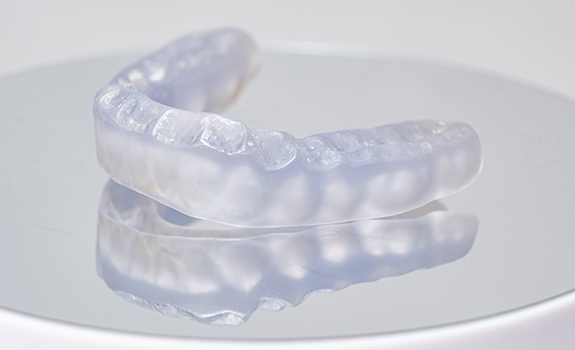TMJ Treatment Rockwall
A Lasting Remedy for Jaw Pain
TMJ disorder can cause persistent discomfort and may even be debilitating at times. If you are struggling with this condition, visit our Rockwall dental team. We offer TMJ treatment as one of our preventive services, and it has proven to be a lasting remedy for jaw pain for many of our patients! Would you like to learn more about it and how it may work to improve the health and function of your oral structures? Continue reading below.

Why Choose Spillman Family Dental of Rockwall for TMJ Treatment?
- Effective & Conservative Treatment Options
- Knowledgeable & Caring Dentists
- Flexible Payment Options
What Is TMJ Disorder?

Everyone has two temporomandibular joints (TMJs). They are located just in front of your ears and are responsible for controlling movements of your lower jaw. The TMJs are among the most complex joints in the body. Unfortunately, they are also somewhat delicate. When they become injured or stressed due to issues like teeth grinding, muscle tension, dental misalignment, or other issues, TMJ disorder (TMD) can develop. In some cases, the cause of TMD remains unknown.
Symptoms of TMJ Disorder

TMD can cause a wide range of symptoms. Here are some signs that you might be suffering from it:
- You have persistent pain and tenderness in your jaw and the surrounding facial muscles.
- It is difficult to move your jaw, or you have a sensation of lockjaw.
- You have frequent headaches and/or migraines.
- There is pain behind your eyes.
- You sometimes experience tinnitus (ringing in your ears).
- There is a popping or clicking noise when you open and close your mouth.
- You have noticed changes in your bite.
Types of TMJ Treatment

Before we provide treatment for your TMD, we will strive to gain an understanding of the problem. In addition to performing a visual examination, we may also need to take some X-rays and ask lots of questions about your symptoms. Based on the information we gather, we will recommend your next steps.
We may advise you to try some home remedies, such as heat/cold therapy or dietary changes, along with professional treatment.
Occlusal Splint

An occlusal splint is essentially a special type of mouthguard. It should be worn at night, and it can prevent teeth grinding and clenching (a common cause of TMD). It can also help your facial muscles to relax, which can lead to reduced aches and pains in your neck, back, and shoulders.
Equilibration/Occlusal Adjustment

TMD may occur if your upper and lower teeth do not fit together quite right. In some cases, this issue is fixable via a minimally invasive procedure known as equilibration. During this treatment, we make adjustments to your teeth or restorations to reduce points of disharmony that might be interfering with the function of your TMJs.
TMJ Treatment FAQs
Can TMJ Be Cured Permanently?
As a TMJ dentist in Rockwall, TX, we want to assure you that significant and lasting relief from TMJ disorder (TMD) is possible. Many individuals experience long-term improvement with conservative treatments such as occlusal splints and occlusal equilibration. These therapies address the root causes of TMJ problems, so they can reduce or even eliminate future TMD flare-ups.
However, keep in mind that factors such as stress, injury, or other changes to your dental health can bring symptoms back. If that happens, talk to us about additional care to get your condition under control.
Is TMJ Treatment Safe?
TMJ treatment in Rockwall is generally very safe, especially when managed by experienced dental professionals. In our practice, we use evidence-based techniques, including occlusal splints and equilibration, which are non-invasive and reversible. These methods aim to relieve jaw pain and restore balance without the risks often associated with surgical intervention.
In the rare cases that surgical intervention is necessary, we will refer you to a trustworthy specialist who will take great care to minimize the risks of your procedure.
How Long Does It Take for a TMJ Splint to Work?
The amount of time required for a TMJ splint to provide noticeable relief varies for each patient. Some individuals feel better within a few days, while others may require several weeks before significant improvement occurs.
During the initial phase of treatment, we will schedule follow-up appointments to assess your progress and make any necessary adjustments to your splint. Consistent use of the splint as directed is essential for optimal results. If you have not experienced significant improvement within a reasonable period of time, we might have to explore other treatment options.
How Long Does Occlusal Equilibration Take for TMJ?
Occlusal equilibration is a precise process that involves adjusting the biting surfaces of your teeth and restorations to improve how they fit together. The duration of this procedure depends on the complexity of your bite and the extent of the adjustments needed. Many equilibration treatments can be completed in one or two appointments, but more complex cases may require additional visits.
After the equilibration, we will monitor your bite and jaw function with the goal of optimizing your results. If further adjustments are needed, we will address them promptly to maintain your comfort and oral health.
Many patients notice a big reduction in their TMD symptoms very soon after their equilibration treatment.
Can TMJ Be Treated Without Surgery?
Yes, the majority of TMJ disorder cases respond very well to non-surgical treatments. In fact, most patients find significant relief through conservative therapies such as occlusal splints and occlusal equilibration.
Surgery is usually reserved for severe cases that do not respond to other treatments. There are different types of surgeries for TMD, which range from minimally invasive to rather extensive. If you do end up needing such a procedure, you can be confident that the potential benefits outweigh the risks and downsides.
